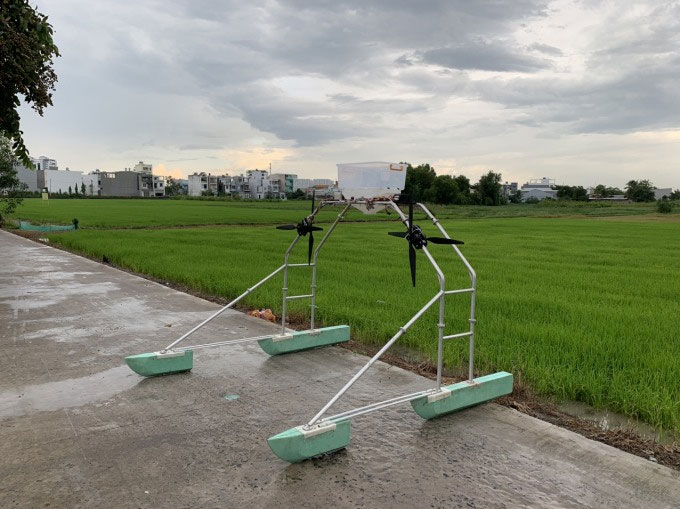Associate Professor Viet makes a machine to automatically plant seeds and fertilize rice
Associate Professor, Dr. Vu Ngoc Anh and his colleagues built a field walking machine that can sow seeds, spray chemicals, and fertilize, with an average yield of 4 hectares per hour, winning second prize in the 2024 Science Initiative.
Associate Professor Anh is a lecturer in aerospace engineering at Ho Chi Minh City University of Technology. He has more than 20 years of experience in researching and designing automation products.
More than 8 years ago, Associate Professor Anh and his team members invented drones used in agriculture to spray pesticides and take care of plants. However, conventional machines have energy costs when carrying large loads and strong downward winds, causing rice plants to fall. The team overcame the limitations, switching from flying devices to AirBoot machines.
Associate Professor Anh and his team spent 2 years designing and testing the ability to operate a multi-purpose rice care machine with the ability to sow, spray, and fertilize. The machine uses many small floats that act as slides to move across the rice fields easily. Airboots operate without leaving water channels, the machine can still move and does not damage the rice plants.
When unloaded, the machine weighs about 15 kg, uses an electric motor with a capacity of about 3,000 W, with a battery that operates continuously for about an hour. Energy is supplied to two propeller engines to help the machine move in the field, at an average speed of 2m/s. According to Associate Professor Anh, the product has the ability to carry 3 times the load compared to drones using the same energy source, while the energy cost remains unchanged, so Airboots saves costs 3 times compared to drones. The machine can be further developed into modules to increase load carrying capacity according to user needs.
"Farmers expect energy costs to remain unchanged but the drone's load-carrying capacity will increase ," Associate Professor Anh said about the problem that he and his colleagues need to solve based on the needs of the agricultural industry.

Multi-function rice care machine designed by the research team. (Photo: NVCC).
The machine is designed below the container with a centrifugal seed spreading system and automatic control with GPS. The control system is integrated into the machine to automatically operate in the field, performing pre-programmed tasks that can be easily managed via smartphones.
According to Associate Professor Anh, the product can achieve an average yield of 4 hectares per hour, equivalent to replacing 10 workers. Airboots cost about 175 million VND. The mini version for small-scale farming operations costs about 100 million VND. In addition to rice, Airboots can use crops grown in rows and rows such as wheat, corn, sugarcane, potatoes, soybeans, vegetables. The machine operates on the ground, without needing permission to fly like a drone.
Associate Professor Anh said that the product is currently being tested for commercial purposes, so a more realistic assessment of feasibility is needed. "The group wants to aim for export and compete with drone products in the world serving agriculture ," Associate Professor Anh said. The product was registered by the group for intellectual property in 2023 and the application was accepted.

Ms. Bui Thanh Van, Secretary of VnExpress Newspaper Editorial Office, Head of the Organizing Committee of the 2024 Scientific Innovation Contest awarded second prize to the research team of Ho Chi Minh City University of Technology on May 16. (Photo: Ngoc Thanh.)
The Airboots agricultural machine product of Associate Professor, Dr. Vu Ngoc Anh and his colleagues won the second prize worth 50 million VND at the 2024 Scientific Innovation contest organized by VnExpress newspaper.
Associate Professor, Dr. Mai Anh Tuan, senior lecturer at the University of Technology, Vietnam National University, Hanoi, head of the jury, highly appreciated the creativity when the authors developed a machine with a mechanism to use sliding floats on the surface. rice field. In fact, similar machine products already exist in Europe but use tires, solar energy. Associate Professor Tuan commented that the mechanical part of the machine can adjust the width to operate on tree beds. have different distances without affecting the tree. The sliding part of the group float structure can be developed into cage or round wheels to be able to travel on many types of terrain.
- Test results: 'Thanh Den ancient rice' is modern rice
- In fact, the rice cooker can split sugar in rice
- Why does rice for overnight change red?
- Unexpected record of cotton of thousand grains
- Thanh Hoa: two farmers make rice transplanters
- Symbiogenics: Strategies to mitigate climate change impacts on rice
- Vietnamese scientist finds the inhibitor of invasive weeds from rice husk
- Why do people need to eat rice every day?
- 'Engineer' in the African field
- Three Outstanding Women Scientists Awarded L'Oréal-UNESCO Awards
- Nano coating made of rice husk
- 10 great plant protein sources to replace animal protein
 'Barefoot engineer' invents a pipeless pump
'Barefoot engineer' invents a pipeless pump Process of handling dead pigs due to disease
Process of handling dead pigs due to disease Radiometer
Radiometer Warp Engine: Technology brings us closer to the speed of light
Warp Engine: Technology brings us closer to the speed of light